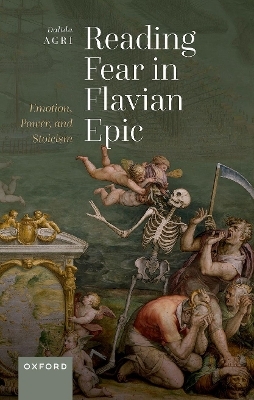
Reading Fear in Flavian Epic
Emotion, Power, and Stoicism
Seiten
2022
Oxford University Press (Verlag)
978-0-19-285930-3 (ISBN)
Oxford University Press (Verlag)
978-0-19-285930-3 (ISBN)
Explores the textual representations of fear and its cognate emotions (anger, envy, and hatred) in Flavian epic through the ancient framework of Stoic thought on emotion, with a focus on Valerius Flaccus' Argonautica, Statius' Thebaid, and Silius Italicus' Punica.
This book examines the textual representations of emotions, fear in particular, through the lens of Stoic thought and their impact on depictions of power, gender, and agency. It first draws attention to the role and significance of fear, and cognate emotions, in the tyrant's psyche, and then goes on to explore how these emotions, in turn, shape the wider narratives. The focus is on the lengthy epics of Valerius Flaccus' Argonautica, Statius' Thebaid, and Silius Italicus' Punica. All three poems are obsessed with men in power with no power over themselves, a marked concern that carries a strong Senecan fingerprint. Seneca's influence on post-Neronian epic can be felt beyond his plays. His Epistles and other prose works prove particularly illuminating for each of the poet's gendered treatment of the relationship between power and emotion. By adopting a Roman Stoic perspective, both philosophical and cultural, this study brings together a cluster of major ideas to draw meaningful connections and unlock new readings.
This book examines the textual representations of emotions, fear in particular, through the lens of Stoic thought and their impact on depictions of power, gender, and agency. It first draws attention to the role and significance of fear, and cognate emotions, in the tyrant's psyche, and then goes on to explore how these emotions, in turn, shape the wider narratives. The focus is on the lengthy epics of Valerius Flaccus' Argonautica, Statius' Thebaid, and Silius Italicus' Punica. All three poems are obsessed with men in power with no power over themselves, a marked concern that carries a strong Senecan fingerprint. Seneca's influence on post-Neronian epic can be felt beyond his plays. His Epistles and other prose works prove particularly illuminating for each of the poet's gendered treatment of the relationship between power and emotion. By adopting a Roman Stoic perspective, both philosophical and cultural, this study brings together a cluster of major ideas to draw meaningful connections and unlock new readings.
Dalida Agri is Hon. Research Fellow at the University of Manchester. She has published on several aspects of Roman literature. Her research interests range widely across Greek and Latin literature, especially epic poetry, ancient philosophy, gender, political thought, and emotion. She is particularly interested in the interactions between literature and philosophy in Roman epic and society.
Preface
Notes on Texts and Abbreviations
Introduction
1: Fear in Flavian representations of epic tyrants: depictions and uses of emotion
2: Reading fear in Valerius Flaccus' Argonautica
3: Reading fear in Statius' Thebaid
4: Reading fear in Silius Italicus' Punica
Epilogue
Bibliography
| Erscheinungsdatum | 05.10.2022 |
|---|---|
| Verlagsort | Oxford |
| Sprache | englisch |
| Maße | 145 x 222 mm |
| Gewicht | 430 g |
| Themenwelt | Literatur ► Klassiker / Moderne Klassiker |
| Geisteswissenschaften ► Sprach- / Literaturwissenschaft ► Anglistik / Amerikanistik | |
| Geisteswissenschaften ► Sprach- / Literaturwissenschaft ► Literaturwissenschaft | |
| ISBN-10 | 0-19-285930-7 / 0192859307 |
| ISBN-13 | 978-0-19-285930-3 / 9780192859303 |
| Zustand | Neuware |
| Informationen gemäß Produktsicherheitsverordnung (GPSR) | |
| Haben Sie eine Frage zum Produkt? |
Mehr entdecken
aus dem Bereich
aus dem Bereich
Poetik eines sozialen Urteils
Buch | Hardcover (2023)
De Gruyter (Verlag)
CHF 83,90
Buch | Softcover (2024)
belleville (Verlag)
CHF 27,95


